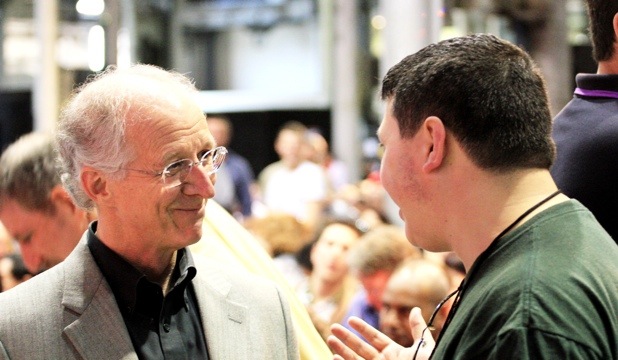Loving the Love of God
I was recently asked how it is possible to love a perfect God.
I am slightly confused by this question, as I don’t see why it would be difficult to love God because of his perfection, as if it would be easier to love him if he had some flaws.
I was happy to think about the topic though, because loving God is the heartbeat of Christianity.
Despite what you may have heard, “Love your neighbour” is not the greatest commandment that Jesus taught. When asked what is the first and greatest commandment, “loving others” was mentioned as the second most important one, flowing out of the first, which is… “Love the Lord your God with all your heart and with all your soul and with all your mind. This is the first and greatest commandment. And the second is like it: ‘Love your neighbour as yourself.’ All the Law and the Prophets hang on these two commandments.” (Matthew 22:37-40)
Loving God with absolutely everything we have is the most important thing we must do. The heart of sin is our lack of love for God. So, how are you going in that area? Do you love the Lord your God with all your heart and with all your soul and with all your mind? Do you even love him with your little toe?
Well, to be frank, I don’t love God very well. I often love my self and my desires and happiness and comfort a lot more than I love God. I definitely don’t love him with ALL my heart and soul and mind. But I expect, you don’t either… and I expect even Mother Teresa didn’t either. The only human being to ever love God wholly and perfectly is Jesus, and because he was the 2nd member of the Trinity incarnate in human flesh, his love was also wrapped up in his intimate knowledge and experience of the love of God shared between the members of the Trinity, so did he have a bit of an advantage?… I reckon so.
Fortunately, the joy of Christianity, is that we have the possibility of joining in on that love as well. We don’t become another member of the Trinity, but we do engage with a fellowship with God that is real and intimate and personal, where the 3rd member of the Trinity, God’s Holy Spirit can reside in us and we can experience the love of God poured out lavishly on us and experience it flowing through us to others.
Although I fail every day in loving God in the way that he deserves and to the degree that he has designed me to love, I do not have to face God’s anger or just condemnation for my lovelessness. God’s forgiveness is an expression of his love as well. But his forgiveness is not cheap. Jesus came, not just to embody God’s love and model love for God, he also came primarily on a rescue mission. He came to pay for our lovelessness – to be punished for our sin.
Why did he go to the cross? He died as the greatest expression of God’s love to a world that doesn’t love him back. He died for me, before I was born, even though he knew I would fail at loving him. He paid the penalty I deserve and 18 years ago I acknowledged that truth and put my life into God’s hands, trusting that Jesus’ death was for me.
 This is what it means for me to love God. It’s actually primarily about me experiencing the love of God and letting that flow out of me back to God and to my neighbour. This changes everything – your entire life. That why Cat & I used this awesome verse from 1 John as the central focus of our wedding: “This is love – not that we loved God, but that he loved us and sent his Son as an atoning sacrifice for our sins. Dear friends, since God so loved us, we also ought to love one another.” (1 John 4:10-11)
This is what it means for me to love God. It’s actually primarily about me experiencing the love of God and letting that flow out of me back to God and to my neighbour. This changes everything – your entire life. That why Cat & I used this awesome verse from 1 John as the central focus of our wedding: “This is love – not that we loved God, but that he loved us and sent his Son as an atoning sacrifice for our sins. Dear friends, since God so loved us, we also ought to love one another.” (1 John 4:10-11)
So now, thanks to what Jesus did 2,000 years ago, and because of what God led me to do 18 years ago, I know God’s love. The more I have experienced and learnt of God over the last 18 years has grown me to love God deeper and deeper, like a good marriage, where at the start the love is all froth and bubbles but after many years it matures and grows deep.
I look forward to loving God more and more as the years pass as well. I want to give him more of my heart and soul and mind, as I experience more and more of his love over the years.

O, if you don’t have any clue what that experience of God’s love looks like or feels like or how it can be real to you as it is real to me, I am praying for you that same prayer that Paul the apostle prayed for the Ephesians: “I pray that you, being rooted and established in love, may have power, together with all of God’s people, to grasp how wide and long and high and deep is the love of Christ, and to know this love that surpasses knowledge—that you may be filled to the measure of all the fullness of God.” (Ephesians 3:17-19)
Truly as the psalmist writes in Psalm 63:3, “Your love is better than life.”
So I love the love of God. My love of God is like the love that someone has for air after they almost drowned. I gasp it in. It is my life. My salvation.
Although, God’s command to love him and our lack of love may hang over you like a gavel from a judge ready to pronounce your guilt, once Christ has freed you from that guilt and you have experienced the love and friendship of God and God comes to reside in you by his Spirit, then love of God ceases to be a demand or a command – it becomes like breathing.
I still suck at loving God. I still have a deep selfishness and lack of love for others. But I am better than I was. God’s love has transformed me and given me new appetites and new joys. I am most alive when I am not hoarding God’s love for myself where it stagnates like a swamp, but when I let it flow through me, back to God and to others like a stream of living water that brings life and love wherever it goes.
Why do many Christians not show the love of God to others? I think primarily because they do not enjoy it themselves.
The love of God is something you can’t keep locked down or bottled up. It’s like a Pandoras Box – open it and you can’t contain it.
I think many Christians are only “Christian” by label and have actually never experienced the love and forgiveness of God themselves (in which case, they would not actually be Christians at all). It is possible to simply mentally tick the box that you believe all that Christian stuff, but you have never actually embraced or encountered or experienced or engaged with it personally. You believe in a God of love, but you do not KNOW the God of love and consequently, how on earth can you SHOW the love of God. If that’s you, I want you to know that Christianity is about a relationship with God, not just a label or a box to tick. There is so much more for you.
There are others though, like me, who have truly experienced the love of God, and yet struggle with letting it flow through us to others (or even back to God). With us, the problem isn’t that there’s no living water flowing in. The problem is with the plumbing. The pipes of our soul are broken or clogged and the water won’t flow through.
The reason for this is because Jesus doesn’t save perfect people. He saves dodgy, broken people. People who haven’t got it all together. People who don’t know how to receive or give love with all of their heart and soul and mind. People who need to be repaired and put right. People like you and me.
Jesus saves people as they are – with all their loveless baggage, and then begins the reconstruction process. It’s a lifelong process that the Bible calls “sanctification”.
But if you know of a Christian who isn’t loving you are right to expect more of them. Be gracious as Jesus is gracious with them, but also know that Jesus want to take them on to being more and more loving.
Ask them what they think about God’s love for them, and if you see their eyes light up and them talk with real and deep knowledge, then you should also see that love spilling over to other people.
If they don’t know of the love of God, then point them to Jesus. Jesus is not just a historical person you read about in an old dusty book. He is alive and able to engage and encounter people. He lived a life of love and died a death of love and opened a way of love for all those who would put the trust in him.
I have been living with his love for the last 18 years and  I look forward to walking with him for the rest of my life.
“And we know that in all things God works for the good of those who love him, who have been called according to his purpose. For those God foreknew he also predestined to be conformed to the likeness of his Son, that he might be the firstborn among many brothers. And those he predestined, he also called; those he called, he also justified; those he justified, he also glorified.Â
What, then, shall we say in response to this? If God is for us, who can be against us? He who did not spare his own Son, but gave him up for us all—how will he not also, along with him, graciously give us all things? Who will bring any charge against those whom God has chosen? It is God who justifies. Who is he that condemns? Christ Jesus, who died—more than that, who was raised to life—is at the right hand of God and is also interceding for us.Â
Who shall separate us from the love of Christ? Shall trouble or hardship or persecution or famine or nakedness or danger or sword? As it is written: ‘For your sake we face death all day long; we are considered as sheep to be slaughtered.‘
No, in all these things we are more than conquerors through him who loved us. For I am convinced that neither death nor life, neither angels nor demons, neither the present nor the future, nor any powers, neither height nor depth, nor anything else in all creation, will be able to separate us from the love of God that is in Christ Jesus our Lord.”
Romans 8:28-39
(6565)
































